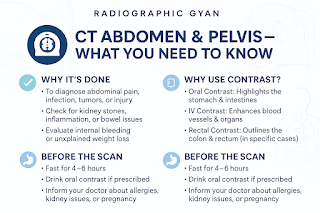1. Why should you do a CT Abdomen and Pelvis?
A CT scan of the abdomen and pelvis is performed to:
-
Investigate abdominal pain
-
Detect tumors, infections, or inflammation
-
Identify internal injuries or bleeding
-
Evaluate digestive tract conditions
-
Monitor the progress of diseases or response to treatment
-
Guide surgical planning, biopsies, or drainage procedures
2. What can be detected in a CT Abdomen and Pelvis?
It can help detect or evaluate:
-
Appendicitis
-
Diverticulitis
-
Pancreatitis
-
Kidney stones
-
Liver disease (e.g., fatty liver, cirrhosis, tumors)
-
Tumors or masses (in liver, pancreas, kidneys, intestines, etc.)
-
Enlarged lymph nodes
-
Aortic aneurysms
-
Bowel obstruction or perforation
-
Abscesses or fluid collections
-
Bladder abnormalities
3. Why should you do an oral contrast scan?
Oral contrast is used to:
-
Highlight the gastrointestinal (GI) tract (stomach, small intestine, colon)
-
Help distinguish bowel loops from other abdominal structures
-
Detect bowel perforations, masses, or inflammation
-
Evaluate for fistulas or abscesses
4. Why is IV (intravenous) contrast needed?
IV contrast is used to:
-
Enhance visibility of blood vessels and organs
-
Differentiate between normal and abnormal tissues
-
Improve detection of tumors, infections, or vascular conditions
-
Show organ perfusion and inflammation
5. Why is rectal contrast sometimes used in CT Abdomen and Pelvis?
Rectal contrast is given to:
-
Better outline the colon and rectum
-
Evaluate for colitis, bowel perforation, or rectal tumors
-
Assess anorectal abscesses or fistulas
-
Improve visualization in post-surgical cases or complex infections
6. What should you do before a CT Abdomen and Pelvis?
-
Fasting: Don’t eat for at least 4–6 hours before the scan (especially if IV/oral contrast is used).
-
Hydration: Drink plenty of water unless advised otherwise.
-
Oral Contrast: You may be asked to drink oral contrast 1–2 hours before the scan.
-
Medical History: Inform the radiologist or technician about:
-
Allergies (especially to iodine or contrast)
-
Kidney issues
-
Diabetes (especially if on metformin)
-
Pregnancy
-
-
Arrive early: You may need time for prep like contrast drinking or IV setup.





No comments:
Post a Comment